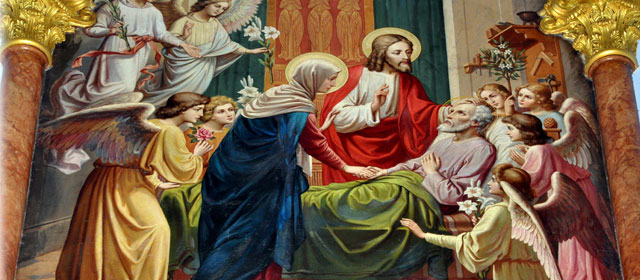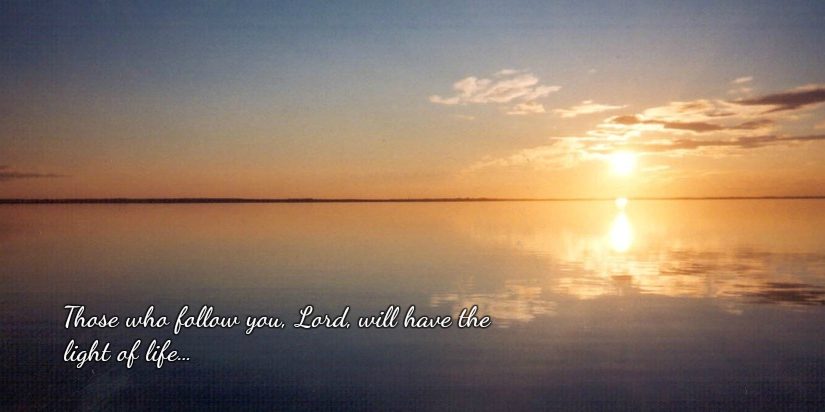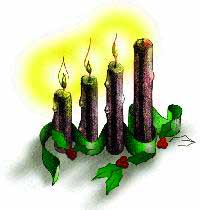Today’s readings
#adventnd #anointingofthesick #healing #mercy
Today’s readings and liturgy call us to rejoice. That’s the reason for the rose-colored vestments and the more joyful tone of today’s readings. This is called Gaudete Sunday: gaudete being Latin for “rejoice,” the first word of today’s introit or proper entrance antiphon which says: “Rejoice in the Lord always; again I say, rejoice. Indeed the Lord is near.” The Church takes that antiphon from the words of the second reading today.
We can especially rejoice in the healing presence of our God. Healing is, in fact, a sure way that we know that Christ is present. Jesus said as much in our Gospel today when he addressed the followers of Saint John the Baptist:
Go and tell John what you hear and see:
the blind regain their sight,
the lame walk,
lepers are cleansed,
the deaf hear,
the dead are raised,
and the poor have the good news proclaimed to them.
Those who lived in and around Jesus in those days had to be amazed at all they were seeing. Indeed, many of them were moved to conversion of heart and rejoiced in all they were seeing.
I think, though, that it can be hard to rejoice when we are suffering from illness or injury. Sometimes when we’re sick, it can even be hard to pray or find God in anything. A wise person once told me that you have to make sure that you’re praying when you’re well, because when you’re sick, it can be hard to pray. But it those times of illness or injury, that’s when you need to rely on God the most. If you have been praying when you’re well, then that relationship is going to be something you can lean on when you need healing.
Indeed sometimes, for us, healing is a little harder to see. We may have been dealing with a persistent, chronic, or even terminal health condition for years. Or maybe we have been at the side of a loved one who has been ill and for whom we have prayed long and hard, but have seen no healing. If that’s where we are right now, Jesus’ words are still our hope. Because healing comes in all sorts of ways, according to what Jesus sees that we need most. That might come in the form of something other than physical healing: perhaps the healing of relationships, or the conversion of our hearts. In every case, though, Christ promises to be with us through it all if we turn to him in our hearts. And he keeps his promises, giving us grace that sees us through whatever stormy waters we are wading.
And so we gather in faith today to express the prayers of our hearts, asking for God’s mercy, praying prayers, perhaps, that we haven’t been able to utter for some reason or another. We gather today to place ourselves in God’s hands and experience his healing, in whatever way is best for us. The Apostle Saint James tells us that we should turn to the Church in time of illness, calling on the priests to anoint the sick in the name of the Lord, knowing that God desires healing, and that the prayer of faith will save the sick and raise them up, forgiving them their sins.
The Church has the Sacrament of Anointing of the Sick because of who Jesus was and because of what he came to do among us. Jesus was that suffering servant from the book of Isaiah’s prophecy, the One who took on our illnesses and bore our infirmities. He was spurned and avoided, oppressed and condemned, all the while giving his life as an offering for sin, justifying many, and bearing their guilt. God always knew the frailty of human flesh, but when he decided to come to his people, he did not avoid that frailty; instead he took it on and assumed all of its effects. This is why we treat the sick with dignity: our frailty was good enough for our God, and we know that the sick are very close to our Lord in their suffering, because he suffered too.
So today if you are sick in any way – body, mind, or spirit, – if you suffer from addiction, chronic pain, or emotional anguish – I invite you to approach the sacrament of the Anointing of the Sick after this homily. The Church teaches that this sacrament is not to be saved only for the moment of death. No, we are to approach it when we are seriously ill, or before surgery, and yes, in the hour of death. If we have been anointed before, we can be anointed again if necessary, even in the same illness, if it has been some time or especially if the illness has progressed. In this sacrament, we pray for healing in body, mind, or spirit, in whatever way God judges to be best for us, and we trust in his sacramental grace and presence with us in our suffering.
Just a procedural note: During the ritual of anointing we will ask those who are to be anointed to stand, and I will impose hands over all of you at one time for a few moments in silence. Then, when it comes time for the anointing, we will come to those who are not ambulatory and are seated in the front of church. Those of you not seated in front will come forward as for Holy Communion, and we will anoint you in the center aisle.
Today we rejoice because our Lord is near. We light that third, rose-colored candle on our Advent wreath and we see there’s not many candles left until the feast of the reason for our rejoicing. We rejoice, too, that we can come to him for help and sustenance and companionship on the journey to healing. We look forward to celebrating the Incarnation, perhaps the greatest and best of the mysteries of faith. That God himself, who is higher than the heavens and greater than all the stars of the universe, would humble himself to be born among us, robing himself with our frail flesh, in order to save us from our sins, heal our brokenness, and make his home among us for all eternity – that is a mystery so great it cannot fail to cause us to rejoice! Indeed that very presence of God gives hope even in our most difficult moments – THE LORD IS NEAR!
These final days of Advent call us to prepare more intensely for the Lord’s birth. They call us to clamor for his Incarnation, waiting with hope and expectation in a world that can sometimes be dark and scary. These days call us to be people of hope, courageously rejoicing that the Lord is near! Come, Lord Jesus! Come quickly and do not delay!







You must be logged in to post a comment.